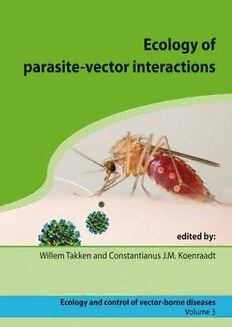
Ecology of parasite-vector interactions PDF
Preview Ecology of parasite-vector interactions
Ecology of parasite-vector interactions edited by: Willem Takken and Constantianus J.M. Koenraadt Ecology and control of vector-borne diseases Volume 3 Ecology of parasite-vector interactions http://avaxhome.ws/blogs/ChrisRedfield Ecology of parasite- vector interactions Ecology and control of vector-borne diseases Volume 3 edited by: Willem Takken and Constantianus J.M. Koenraadt (cid:59)(cid:69)(cid:75)(cid:73)(cid:82)(cid:77)(cid:82)(cid:75)(cid:73)(cid:82)(cid:3)(cid:37)(cid:71)(cid:69)(cid:72)(cid:73)(cid:81)(cid:77)(cid:71)(cid:3) (cid:52) (cid:89) (cid:70) (cid:80) (cid:77) (cid:87) (cid:76) (cid:73) (cid:86) (cid:87) Buy a print copy of this book at: www.WageningenAcademic.com/ecvd-03 This work is subject to copyright. All rights are reserved, whether the whole or part of the material is concerned. Nothing from this publication may be translated, reproduced, stored in a computerised system or published in any form or in any manner, including electronic, mechanical, reprographic or photographic, without prior written permission from the publisher: ISBN: 978-90-8686-188-0 Wageningen Academic Publishers, e-ISBN: 978-90-8686-744-8 P.O. Box 220, 6700 AE Wageningen, DOI: 10.3920/978-90-8686-744-8 the Netherlands, [email protected], www.WageningenAcademic.com ISSN: 1875-0699 The individual contributions in this publication and any liabilities arising from them remain the First published, 2013 responsibility of the authors. The publisher is not responsible for possible © Wageningen Academic Publishers damages, which could be a result of content The Netherlands, 2013 derived from this publication. Ecology and control of vector-borne diseases In the past century, many advances were made in the control of vector-borne diseases. Malaria disappeared from the northern hemisphere, diseases such as typhus, Bartonella and yellow fever were seriously reduced in prevalence and in many countries effective methods of disease control contributed to a greatly reduced incidence of such diseases. Most of these advances were beneficial to the industrialised world, whereas underdeveloped countries continued to suffer much as before. Indeed, several diseases such as malaria, Rift Valley fever and African sleeping sickness are still highly prevalent in parts of the tropics. ‘New’ vector-borne diseases such as dengue, chikungunya fever and West Nile fever, have emerged and are invading previously disease-free regions. The discovery of new drugs and vaccines has made great advances and allows for the effective treatment and control of many diseases. In contrast, vector control has lagged behind in development, even though it is realised that effective vector control would allow for an immediate interruption of the transmission of disease, and aid in disease control and eradication. In the last decade new initiatives on vector control have been undertaken, leading to a rapid development of effective and lasting methods of vector control. For example, the Roll Back Malaria control programme of the World Health Organization has led to significant reductions in malaria in many countries. In order to achieve further advances, however, additional tools are required. The development of molecular genetics has provided new insight in vector biology and behaviour, which is being used for developing new strategies of vector control. Advances in geographic information systems allow for precision targeting of interventions. The collective information on new developments in Vector Ecology and Control for Vector-borne Diseases is scattered over numerous periodicals and electronic databases. This book series intends to bring together this information in sequential volumes arranged around selected themes that are currently of interest. Forthcoming themes will include ‘Recent advances in biological control of mosquitoes’, ‘Transgenic tools for vector management’ and ‘Integrated management of vectors of livestock diseases’, but also fundamental biological topics such as ‘Mating behaviour of disease vectors’, ‘Oviposition behaviour of disease vectors’ and ‘Reproductive strategies of disease vectors’. Other topics will be added as perceived relevant. Willem Takken is the senior editor of the series. Each volume will be co-edited by a guest editor, which in Volume 3 is Sander Koenraadt. The editors of the current volume are well-known experts in the field of Medical and Veterinary Entomology, and have experience from field work in the tropics and ecological studies in laboratory and field. Willem Takken is professor in Medical and Veterinary Entomology at Wageningen University. Sander Koenraadt is an assistant professor in Vector Ecology at Wageningen University. Both editors collaborate in several research programmes, and consider dissemination of research results to fellow scientists as well as the public at large as an important component of their work. Ecology of parasite-vector interactions 5 Table of contents Preface 11 Willem Takken and Constantianus J.M. (Sander) Koenraadt 1. Introduction – who was there first? 13 Willem Takken and Constantianus J.M. Koenraadt Fundamental aspects of vector-parasite interactions 17 2. Impact of transgenic immune deployment on mosquito fitness 19 Andrew D. Pike, Chris M. Cirimotich and George Dimopoulos 3. Plant-sugar feeding and vectorial capacity 35 Chris M. Stone and Woodbridge A. Foster 4. V ector competence for arboviruses in relation to the larval environment of mosquitoes 81 Barry W. Alto and L. Philip Lounibos 5. Relevant temperatures in mosquito and malaria biology 103 Krijn P. Paaijmans and Matthew B. Thomas 6. Evolutionary aspects of Anopheles-Plasmodium interactions 123 Louis Lambrechts and Jacob C. Koella Species-specific interactions 139 7. Tick – Borrelia interactions: burden or benefit? 141 Fedor Gassner and Nienke Hartemink 8. W olbachia in Aedes mosquitoes: towards biological control of vector-borne diseases 155 Luciano A. Moreira 9. Behaviour of sandflies infected with Leishmania 167 Paul D. Ready and Matthew E. Rogers Strategic issues concerning vector-parasite interactions 179 10. Modelling the control of mosquito-borne diseases 181 Ace North and Penelope Hancock 11. Heterogeneity in malaria transmission: underlying factors and implications for disease control 197 Teun Bousema and Amrish Baidjoe Ecology of parasite-vector interactions 7 12. C onsiderations for male fitness in successful genetic vector control programs 221 Michelle E.H. Helinski and Laura C. Harrington Epilogue 245 13. Ecology of parasite-vector interactions: expect the unexpected 247 Constantianus J.M. Koenraadt and Willem Takken About the editors 253 Contributors 255 Reviewers 258 Keyword index 259 8 Ecology of parasite-vector interactions
